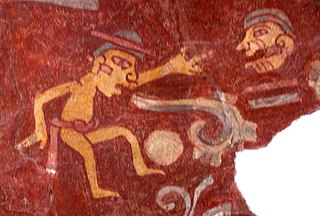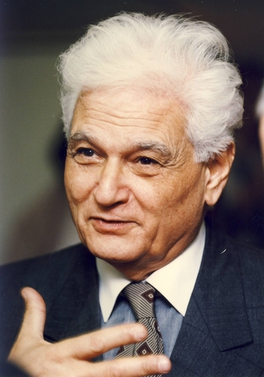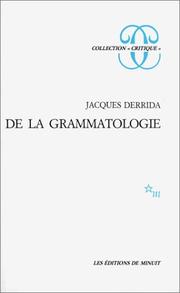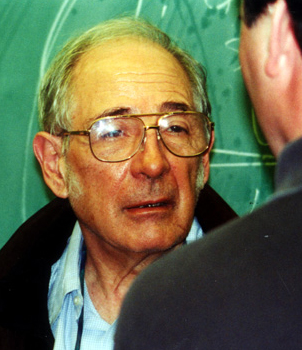Deconstruction is a loosely-defined set of approaches to understanding the relationship between text and meaning. The concept of deconstruction was introduced by the philosopher Jacques Derrida, who described it as a turn away from Platonism's ideas of "true" forms and essences which are valued above appearances.

Ferdinand de Saussure was a Swiss linguist, semiotician and philosopher. His ideas laid a foundation for many significant developments in both linguistics and semiotics in the 20th century. He is widely considered one of the founders of 20th-century linguistics and one of two major founders of semiotics, or semiology, as Saussure called it.

Language is a structured system of communication that consists of grammar and vocabulary. It is the primary means by which humans convey meaning, both in spoken and written forms, and may also be conveyed through sign languages. Human language is characterized by its cultural and historical diversity, with significant variations observed between cultures and across time. Human languages possess the properties of productivity and displacement, which enable the creation of an infinite number of sentences, and the ability to refer to objects, events, and ideas that are not immediately present in the discourse. The use of human language relies on social convention and is acquired through learning.

Structuralism is an intellectual current and methodological approach, primarily in the social sciences, that interprets elements of human culture by way of their relationship to a broader system. It works to uncover the structural patterns that underlie all the things that humans do, think, perceive, and feel.

Jacques Derrida was an Algerian-born French philosopher. He developed the philosophy of deconstruction, which he utilized in a number of his texts, and which was developed through close readings of the linguistics of Ferdinand de Saussure and Husserlian and Heideggerian phenomenology. He is one of the major figures associated with post-structuralism and postmodern philosophy although he distanced himself from post-structuralism and disowned the word "postmodernity".
Différance is a French term coined by Jacques Derrida. It is central to Derrida's concept of deconstruction, a critical outlook concerned with the relationship between text and meaning. The term différance means both "difference of meaning" and "deferral of meaning".
In the philosophy of language and speech acts theory, performative utterances are sentences which not only describe a given reality, but also change the social reality they are describing.
In critical theory and deconstruction, phallogocentrism is a neologism coined by Jacques Derrida to refer to the privileging of the masculine (phallus) in the construction of meaning. The term is a blend word of the older terms phallocentrism and logocentrism.
"Logocentrism" is a term coined by the German philosopher Ludwig Klages in the early 1900s. It refers to the tradition of Western science and philosophy that regards words and language as a fundamental expression of an external reality. It holds the logos as epistemologically superior and that there is an original, irreducible object which the logos represent. According to logocentrism, the logos is the ideal representation of the Platonic ideal.
A binary opposition is a pair of related terms or concepts that are opposite in meaning. Binary opposition is the system of language and/or thought by which two theoretical opposites are strictly defined and set off against one another. It is the contrast between two mutually exclusive terms, such as on and off, up and down, left and right. Binary opposition is an important concept of structuralism, which sees such distinctions as fundamental to all language and thought. In structuralism, a binary opposition is seen as a fundamental organizer of human philosophy, culture, and language.
Jonathan Culler is an American literary critic. He was Class of 1916 Professor of English and Comparative Literature at Cornell University. His published works are in the fields of structuralism, literary theory and literary criticism.
Performativity is the concept that language can function as a form of social action and have the effect of change. The concept has multiple applications in diverse fields such as anthropology, social and cultural geography, economics, gender studies, law, linguistics, performance studies, history, management studies and philosophy.
Difference is a key concept of philosophy, denoting the process or set of properties by which one entity is distinguished from another within a relational field or a given conceptual system. In the Western philosophical system, difference is traditionally viewed as being opposed to identity, following the Principles of Leibniz, and in particular, his Law of the identity of indiscernibles. In structuralist and poststructuralist accounts, however, difference is understood to be constitutive of both meaning and identity. In other words, because identity is viewed in non-essentialist terms as a construct, and because constructs only produce meaning through the interplay of differences, it is the case that for both structuralism and poststructuralism, identity cannot be said to exist without difference.
French philosophy, here taken to mean philosophy in the French language, has been extremely diverse and has influenced Western philosophy as a whole for centuries, from the medieval scholasticism of Peter Abelard, through the founding of modern philosophy by René Descartes, to 20th century philosophy of science, existentialism, phenomenology, structuralism, and postmodernism.

Limited Inc is a 1988 book by the French philosopher Jacques Derrida, containing two essays and an interview.
In the philosophy of language, "Arche-writing" is a concept introduced by French philosopher Jacques Derrida which refers to an abstract kind of writing that precedes both speech and actual writing. In the West, phonetic writing was considered as a secondary imitation of speech, a poor copy of the immediate living act of speech. Arche-writing is, in a sense, language, in that it is already there before we use it, it already has a pregiven, yet malleable, structure/genesis, which is a semi-fixed set-up of different words and syntax. This fixedness is the writing to which Derrida refers, just such a 'writing' can even be seen in cultures that do not employ writing, it could be seen in notches on a rope or barrel, fixed customs, or placements around the living areas.
In analytic philosophy, philosophy of language investigates the nature of language and the relations between language, language users, and the world. Investigations may include inquiry into the nature of meaning, intentionality, reference, the constitution of sentences, concepts, learning, and thought.

Of Grammatology is a 1967 book by the French philosopher Jacques Derrida. The book, originating the idea of deconstruction, proposes that throughout continental philosophy, especially as philosophers engaged with linguistic and semiotic ideas, writing has been erroneously considered as derivative from speech, making it a "fall" from the real "full presence" of speech and the independent act of writing.
Trace is one of the most important concepts in Derridian deconstruction. In the 1960s, Jacques Derrida used this concept in two of his early books, namely Writing and Difference and Of Grammatology.

The Searle–Derrida debate refers to a famous intellectual controversy opposing John Searle and Jacques Derrida, after Derrida responded to J. L. Austin's theory of the illocutionary act in his 1972 paper "Signature Event Context". In his 1977 essay Reiterating the Differences: A Reply to Derrida, Searle argued that Derrida's apparent rejection of Austin was unwarranted, but later refused to let this 1977 reply be printed along with Derrida's papers in the 1988 collection Limited Inc — in which a new text by Derrida ridiculed Searle's positions on the topic. In the 1990s, Searle clarified why he did not consider Derrida's approach to be legitimate philosophy.